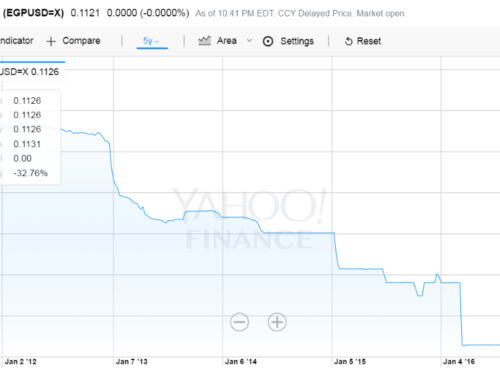
There’s a strange practice in Egyptian media: it refers to nearly every country, particularly developing ones, as a “sister country”. Newspaper articles never fail to mention “Sister Tunisia” or “Brother Iraq”. If it’s not a sister country, it is at least a “brotherly people”. Sincere or not, such rhetoric is so common that we barely notice it.
But pause and recognition of this odd practice automatically begs the question:
How do Egyptians really feel about the rest of the world?
The Tahrir Trends survey conducted in May/June 2013 captured a snapshot of Egyptian public opinion at a particularly interesting juncture. It portrays Egypt after nearly a year of Muslim Brotherhood rule, yet before the July 3rd coup and subsequent bout of army-driven nationalism and populism – particularly relevant to our analysis here.
Let’s start with the country Egyptians love to hate, despite its position as the top non-Arab emigration destination and as one of the largest Egyptian diaspora hosts: The United States of America.
18% have a positive opinion of the United States. 8% have a somewhat negative opinion and a whopping 53% declared a “very negative” opinion of the country.
U.S.-Egypt politics have long been strained despite generations of Egyptian youth with media-inspired dreams of the United States. The US is local politicians’ favorite scapegoat for virtually everything. Over the last year, all political players have accused the Americans of supporting their opponents. American Ambassador Patterson has practically become a household name, playing the role of Colonial High Commissioner role in the Egyptian collective imagination. Longstanding perceptions of American pro-Israeli involvement in the Israeli-Arab conflict – one of the few foreign affairs issues that Egyptians follow – add to this negative perception.
Oddly, Canada fares worse than the United States: 16% of Egyptians have a positive opinion of Canada while 47% perceive it negatively. I say “oddly” because Canadian self-effacement is widely considered neutral. As one joke goes, you can identify Canadians from the Canadian flag on their backpack – and you can identify Americans from the two Canadian flags on their backpacks. Now, it seems that Canada is suffering from the overspill of Egyptian negativity towards neighboring America.
In the Middle East, Saudi Arabia commands the best perception, with almost 70% of respondents saying they have a very or somewhat positive impression of the country. Still, more than one out of nine Egyptians feels “very negative” toward Saudi Arabia. Virtually every Egyptian has a personal connection to Saudi Arabia, which is home to an Egyptian expatriate community of 1.7 million and serves as the main destination of Egyptian (religious) tourism. Although limited and sporadic, this personal experience has shaped Egyptian opinions, as has the last year’s worth of political messaging about Saudi Arabia’s opposition to the Muslim Brotherhood.
Opinion of the UAE remains overall positive, at 56% favorable respondents versus the 25% with a negative outlook. The Emirates are also a migration destination for Egyptian workers, but with less political baggage than Saudi Arabia. Opinions are more polarized on Qatar, which has held a palpable political presence in Egypt over the last two years. Nearly twice as many people declared having a “very negative” opinion of Qatar (33.9%) rather than a “very positive” one (18%). More than 20% remained ambivalent, replying that they “didn’t know.”
Unsurprisingly, 90% of respondents said they had a “very negative” opinion of Israel. But that does not necessarily translate into support for Palestine, toward which 41% of respondents hold a “negative” view. Only 17% declared themselves “very positive” about Palestine. In fact, most respondents appear to be rather isolationist. Two-thirds of responses to a later question were against Egypt opening the border with Gaza, even though the border crossing only allows for the passage of people and not goods.
Furthermore, 46% of respondents believe that Egypt should not increase any support to Palestinian governments in either Ramallah or Gaza City. A third of respondents said Egypt should increase support to both; 14% favored an increase of support for the Palestinian Authority only, and 2% indicated they’d prefer an increase in support Hamas.
Iran, which garnered a “very negative” opinion from 60% of respondents, is second only to Israel as a Middle Eastern pariah state. Egypt has no diplomatic relations with Iran. While political opinions on Iran are regionally ambivalent, the past year or two’s feeble detente attempts have clearly backfired. The handful of Iranian visitors who made it to Egypt this year – the first in three decades – suffered endless suspicion from Egyptian citizens, so much that they were forbidden to visit Egypt’s Islamic quarter out of fear that they might convert Egyptians into Shiism. (Yes, we can be that ridiculous.)
Europe, home of our historical neighbors, fellow Mediterranean riparians and largest commercial partners, doesn’t get much love either. European countries suffer from a severe brand recognition syndrome, with many respondents saying they don’t know how they perceive European countries.
For the EU as a whole, 48% of Egyptians surveyed had a negative opinion of the Union, while 21% had “somewhat” or “very positive” opinions. Responses to Northern European countries are even stranger. While 45% fell in the “I don’t know” category, most of the remaining had a negative opinion: 40% with respect to Sweden and 40% regarding Norway. Four-fifths of those votes were “very negative”. Only about 13% of respondents were positive about either country.
Scandinavian countries may be the “happiest Countries in the world,” according to a report published this week, but Egyptians don’t seem to care.
The Netherlands fared marginally better. 19% of respondents had positive opinions, compared to 43% with negative ones.
Dutch presence in Egyptian media over the past several years might actually be due to the antics of Dutch Islamophobes. Compared to Scandinavian countries that seldom appear on the average Egyptian’s screen, the Netherlands nevertheless commands more positive feelings from Egyptians.
A quarter of respondents are positive towards Britain – 25%, to be precise. But almost a third of respondents (32%) were “very negative” about Britain, and 11% only somewhat so. Britain’s history of political activity in the Middle East might lead one to expect more negative responses. But as a favored destination for Egyptians tourists and migrants (English being the foreign language we torture the least, and Britain holding the advantage of proximity over North America), Britain holds favorable regard from a strong segment of Egyptians.
France, Egypt’s (well, Mubarak’s Egypt) great friend, has seen its reputation a little tarnished as of late. 28% of respondents were positive, compared to 41% who were not.
Germany’s soft power in Egypt comes in the form of Red Sea tourism: 1.2 million Germans visited Egypt yearly pre-revolution, making them the second largest touristic mass in the country. As such, 31% of respondents were positive about Germany, making it the most liked European country on the survey.
Interestingly, Egyptians seem to like East Asia. 50% of respondents have a positive opinion of both China and Japan. 18%, on the other hand, have a “very negative” opinion, and 25% of respondents stated they “didn’t know.” The distribution of opinions on China and Japan are similar enough for one to assume that respondents found it difficult to distinguish between them.
I’ll venture that the average Egyptian knows as much about Norway as they do about Japan, which begs the question: why the discrepancy? I can hardly think of a justification beyond irrational bias.
So much for the international ‘brotherly’ affection of our newspaper headlines – Egyptians seem to dislike most of the rest of the world. For a country where roughly 1 out of every 9 Egyptians makes his living directly from tourism, Egypt would do well to educate its citizens away from xenophobia.
Originally published on Tahrir Squared, as part of the TahrirTrends project.
Data Methodology:
The survey was done according to the most stringent polling standards, with the results based on face-to-face interviews with 1100 adults who were aged 15 and older. These interviews were conducted between the last week of May and the first week of June, conducted in 22 governorates, representing the country at large (the remaining 5 governorates in total account for 1.8% of the country’s population). As this sample was aimed at capturing a nationally accurate picture of adult Egyptian public opinion, one can say with 95% confidence that the maximum margin of sampling error is 3.4 percentage points. Given the strict probability basis of the sample, including randomization of the selected respondent within any given household, minimum weighting of the data was required.




